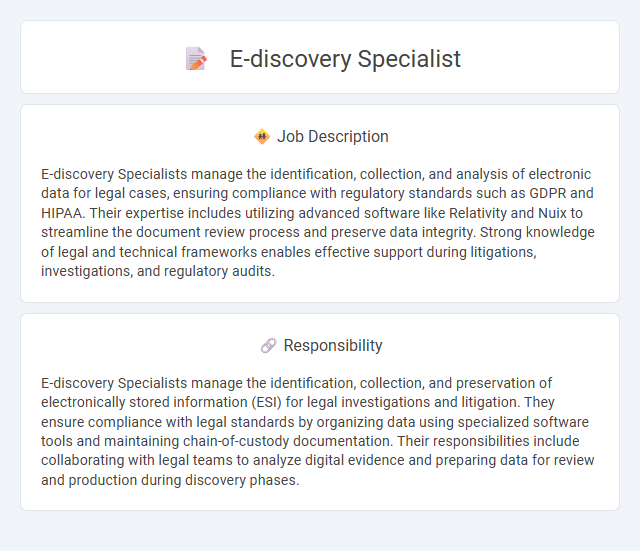
E-discovery Specialists manage the identification, collection, and analysis of electronic data for legal cases, ensuring compliance with regulatory standards such as GDPR and HIPAA. Their expertise includes utilizing advanced software like Relativity and Nuix to streamline the document review process and preserve data integrity. Strong knowledge of legal and technical frameworks enables effective support during litigations, investigations, and regulatory audits.
Individuals with strong analytical skills and a keen attention to detail are likely to excel as E-discovery Specialists, as the role involves managing complex legal data and ensuring compliance with regulatory standards. Those comfortable working in fast-paced, technology-driven environments may find this job particularly suitable, given its reliance on specialized software and continuous adaptation to evolving legal requirements. People who prefer structured tasks but can also navigate ambiguity might have a higher probability of success in this profession.
Qualification
An E-discovery Specialist requires expertise in legal technology, proficient use of e-discovery tools such as Relativity, Clearwell, and Nuix, and knowledge of Federal Rules of Civil Procedure related to electronic evidence. Strong analytical skills, attention to detail, and experience with data preservation, collection, processing, review, and production are essential. Certifications like Certified E-Discovery Specialist (CEDS) or Relativity Certified Administrator enhance qualifications and demonstrate industry proficiency.
Responsibility
E-discovery Specialists manage the identification, collection, and preservation of electronically stored information (ESI) for legal investigations and litigation. They ensure compliance with legal standards by organizing data using specialized software tools and maintaining chain-of-custody documentation. Their responsibilities include collaborating with legal teams to analyze digital evidence and preparing data for review and production during discovery phases.
Benefit
E-discovery Specialists likely improve legal teams' efficiency by streamlining the digital evidence review process, reducing time and costs associated with litigation. They probably enhance data accuracy and compliance, minimizing risks of legal penalties and ensuring regulatory adherence. Their expertise in managing large data sets could provide organizations with a competitive advantage in handling complex legal cases.
Challenge
E-discovery specialists likely face the challenge of managing vast volumes of digital data while ensuring accuracy and compliance with legal standards. The complexity of evolving technology and regulations may require continuous learning and adaptation to new tools and practices. Handling sensitive information under tight deadlines could increase pressure, making attention to detail and efficient problem-solving essential.
Career Advancement
E-discovery Specialists command expertise in managing electronic data for legal cases, leveraging advanced tools and technologies to support litigation processes. Career advancement opportunities include progressing to roles such as E-discovery Manager, Litigation Support Analyst, or Information Governance Specialist, often requiring proficiency in data management, legal compliance, and technology solutions. Continuous certification and skill development in platforms like Relativity and knowledge of data privacy regulations significantly enhance prospects for leadership positions in legal technology and consulting firms.
 kuljobs.com
kuljobs.com